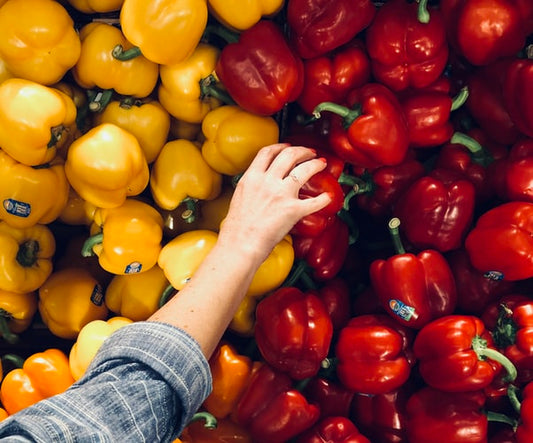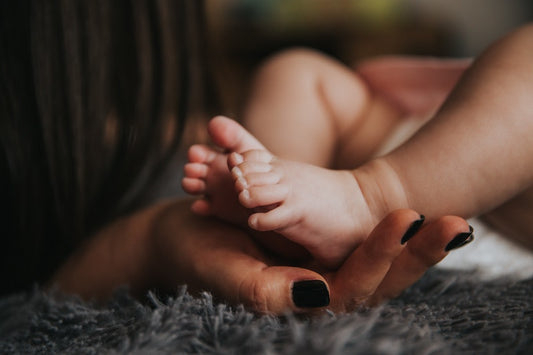HEALING FOOD: FOODS TO EAT TO AID RECOVERY AFTER GIVING BIRTH
Healthy nutrition can help ensure that you have enough energy to look after your new baby, as well as aiding in the healing process after giving birth!
Having a baby is such an exciting time for a new mother. As you look after your little one, balancing care for yourself is also important.
Here at Babease, we understand that being a new parent can be a busy time, so we have developed this blog to provide guidance on the foods that support healthy recovery post-birth.
Babease Top Tip
As a new parent and with a new, busy schedule, you may find that small, frequent meals and snacks are easier to digest than large meals. Where possible, it can help to enlist the support of others to prepare meals for you, such as your partner, friends or relatives.

Post-Birth Nutrition
Labour uses up a lot of energy, especially if you’ve had a prolonged birth. Therefore, it is fundamental for your energy to be restored and replaced after giving birth.
It is important that you have an overall balanced nutritional intake from all of the food groups to help support this. It is good to include plenty of the following:
- Vegetables
- Fruits
- Dairy products
- Wholegrain carbohydrates
- High protein foods such as meat, fish, eggs, lentils, beans, nuts, seeds and nut butters.
We are going to look at the essential nutrients and vitamins found in these foods, and how they help the healing and recovery process.
Babease Top Tip
The NHS recommends that trying to include your five portions of fruit and vegetables a day is a great start. It might sound fairly basic, but many of us can find it challenging to reach this goal.
Not only will it support you on the road to recovery post-birth, but it also introduces healthy eating to your new family and sets an example for your little one to follow as they grow!
Talking to a Health Professional
Any changes you make to your diet as a new parent should be discussed with a healthcare professional first; whether this is your GP, midwife, health visitor or another qualified healthcare expert.
There is plenty of support available to help new parents implement effective, healthy eating lifestyles. Always talk through your thoughts with a professional first.

Centralise Food Around Starchy Carbohydrates
In order to obtain sufficient energy, try to base all your meals on starchy carbohydrates such as pasta, rice, couscous, potato and bread.
It is recommended to include as many wholegrain varieties as possible, as they provide fibre and additional nutrients such as B vitamins.
Also incorporate some healthy fats such as:
- Avocado
- Nuts
- Seeds
- Nut butters
- Olive oil
- Rapeseed oil
Pack Up on Protein
Protein is very important in the healing process. Protein supplies essential amino acids for the repair and healing of tissues. Foods with sufficient amounts of protein include:
- Fish
- Eggs
- Pulses
- Beans
- Nuts
- Meat
Where possible, try to include a form of high protein food with all your meals and snacks.
Vitamin C and Zinc
Vitamin C and zinc are particularly important micronutrients for wound healing.
If a mum has had any tearing or if she is recovering from a C-section, it can be an especially important part of her diet.
Vitamin C Foods
Vitamin C is involved in collagen formation and cross-linking and has essential antioxidant properties to help the immune system. Vitamin C also helps with the absorption of vegetarian sources of iron.
Good food sources of vitamin C include:
- Oranges and other citrus fruits
- Strawberries
- Kiwi fruit
- Blackcurrants
- Broccoli
- Peppers (particularly red and green peppers)
- Potatoes
- Brussel Sprouts
Zinc Foods
Zinc plays a key role in collagen formation, tissue growth and wound healing.
Good food sources of zinc include:
- Meat
- Shellfish
- Milk
- Cheese
- Bread (wholegrain)
- Baked beans
- Fortified cereal products
- Wheat germ
Vitamin B
Other vitamins that are important in healing and recovery include the B vitamins (also known as vitamin B-complex), which is essential for carbohydrates to be used as energy by the body.
B vitamins occur widely in many different types of foods. Good sources include:
- Wholegrain bread
- Cereals
- Brown rice
- Eggs
- Milk
- Fruits
- Vegetables (particularly green leafy vegetables)
- Meats
- Fish
Vitamin A
Vitamin A is another essential vitamin that stimulates collagen synthesis and improves immune function.
Substantial sources of fat-soluble vitamin A include:
- Eggs
- Cheese
- Oily fish
- Fortified spreads
- Full fat milk
- Yoghurts
Liver products, such as liver pâté, are also an excellent source of vitamin A, but take care, as too much vitamin A is not good for your health.
Beta-carotene
Another way of getting vitamin A into your diet is by including foods rich in beta-carotene, which can be converted to vitamin A in the body.
Foods rich in beta-carotene include yellow fruits such as:
- Mango
- Papaya
- Apricots
Yellow, red and green (leafy) vegetables are also healthy sources of beta-carotene:
- Spinach
- Carrots
- Sweet potatoes
- Red peppers
Vitamin E
Vitamin E acts as an antioxidant and is also a fat-soluble vitamin.
Trusted sources of vitamin E include plant oils, such as:
- Soya
- Corn
- Olive oil
- Nuts
- Seeds
- Wheat germ (found in cereals and cereal products)
Copper
In addition to zinc, another vital mineral in healing and recovery is copper, which is necessary for the immune system's proper functioning.
Good sources of copper include
- Nuts
- Shellfish
- Offal
Iron
Iron is an integral nutrient which we require for oxygen transport, normal immune function and collagen synthesis.
Iron in foods is found in two forms, haem iron and non-haem iron.
Haem Iron
Haem iron is very well absorbed, and excellent food sources include meat and meat products. In particular, it can be found in darker meats such as:
- Beef
- Lamb
- Duck
- Liver
Oily fish and egg yolk are also good sources of iron.
Non-haem Iron
Vegetarian and non-haem sources of iron include:
- Baked beans
- Chickpeas
- Lentils
- Tofu
- Soya beans
- Raisins
- Dried apricots
- Broccoli
- Broad beans
- Blackcurrants
- Spring greens
- Spinach
- Fortified breakfast cereals
To improve the absorption of non-haem iron, include foods rich in vitamin C at the same time.
Please note: take care not to take supplements with large and excessive amounts of these micronutrients, as mega doses can be potentially harmful. If in doubt, speak with your midwife or another healthcare professional.

Keep Hydrated
It is also imperative to stay well hydrated, especially if you are breastfeeding, as water contributes to around 90% of breast milk.
However, staying hydrated should be treated with seriousness no matter where you are in life. It plays an essential role in maintaining energy levels, regulating mood swings and just your overall health.
Babease Top Tip
Try to get into the habit of having a glass of water every time you feed your baby!
Hopefully, you can leave our blog feeling confident of which foods to eat to help you on the path to recovery post-birth!
GET 20% OFF YOUR FIRST ORDER!
Join the Baby Club for FREE weaning help and advice.





